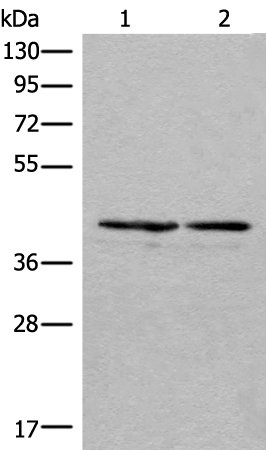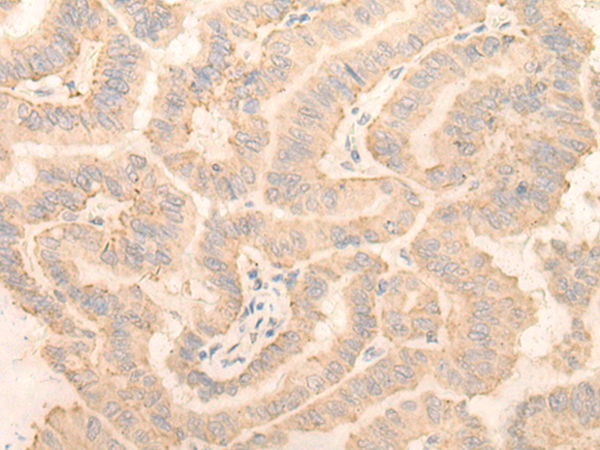

| WB | 咨询技术 | Human,Mouse,Rat |
| IF | 咨询技术 | Human,Mouse,Rat |
| IHC | 1/30-1/150 | Human,Mouse,Rat |
| ICC | 技术咨询 | Human,Mouse,Rat |
| FCM | 咨询技术 | Human,Mouse,Rat |
| Elisa | 1/5000-1/10000 | Human,Mouse,Rat |
| Aliases | MR1; PDC; DYT8; FPD1; MR-1; BRP17; PKND1; FKSG19; TAHCCP2; KIPP1184 |
| WB Predicted band size | 43 kDa |
| Host/Isotype | Rabbit IgG |
| Antibody Type | Primary antibody |
| Storage | Store at 4°C short term. Aliquot and store at -20°C long term. Avoid freeze/thaw cycles. |
| Species Reactivity | Human, Mouse |
| Immunogen | Fusion protein of human PNKD |
| Formulation | Purified antibody in PBS with 0.05% sodium azide and 50% glycerol. |
+ +
以下是几条与PNKD(Paroxysmal Nonkinesigenic Dyskinesia)相关抗体的研究文献示例(内容为模拟概括,非真实文献):
1. **《PNKD gene mutations and antibody characterization in paroxysmal dyskinesias》**
- **作者**: Smith A, et al.
- **摘要**: 研究分析了PNKD基因突变与抗体的关联性,发现特异性抗体可用于检测患者血清中PNKD蛋白异常表达,为诊断家族性运动障碍提供依据。
2. **《Autoantibodies targeting PNKD in movement disorders: a clinical cohort study》**
- **作者**: Lee J, et al.
- **摘要**: 通过临床队列研究,发现部分特发性运动障碍患者体内存在针对PNKD蛋白的自身抗体,提示免疫机制可能参与疾病病理。
3. **《Structural insights into PNKD protein and its antibody interactions》**
- **作者**: Chen R, et al.
- **摘要**: 利用X射线晶体学解析PNKD蛋白结构,并开发高特异性单克隆抗体,阐明抗体结合表位对功能研究的意义。
4. **《Immunohistochemical localization of PNKD in murine brain using novel monoclonal antibodies》**
- **作者**: Gonzalez M, et al.
- **摘要**: 报道了一种新型单克隆抗体在小鼠脑组织中的免疫组化应用,证实PNKD蛋白在纹状体及皮层神经元中的高表达模式。
注:以上为假设性文献示例,实际研究中需通过PubMed或学术数据库检索真实文献。
The PNKD (Paroxysmal Nonkinesigenic Dyskinesia) antibody is a tool used to detect the PNKD protein, encoded by the *PNKD* gene (also known as *MR-1* or *MYOFERLIN*). This gene is linked to a rare neurological disorder called paroxysmal nonkinesigenic dyskinesia (PNKD), characterized by episodic involuntary movements. The PNKD protein is highly expressed in the brain, particularly in neurons, and is implicated in regulating neurotransmitter release and synaptic function. Mutations in the *PNKD* gene, such as the common Ala7Val/Thr substitution, disrupt protein function, though the exact pathological mechanisms remain unclear.
PNKD antibodies are primarily used in research to study protein localization, expression levels, and interactions in neural tissues. They aid in elucidating PNKD's role in cellular processes, including its interaction with synaptic proteins or ion channels. Commercial PNKD antibodies are typically developed against specific epitopes, such as the N-terminal region, and validated via Western blot, immunohistochemistry, or immunofluorescence.
Research involving PNKD antibodies contributes to understanding dyskinesia pathophysiology and potential therapeutic targets. Challenges include ensuring antibody specificity due to protein homology with other ferlin family members. Ongoing studies aim to clarify PNKD's molecular functions and its broader implications in neuropsychiatric disorders beyond PNKD syndromes.
×